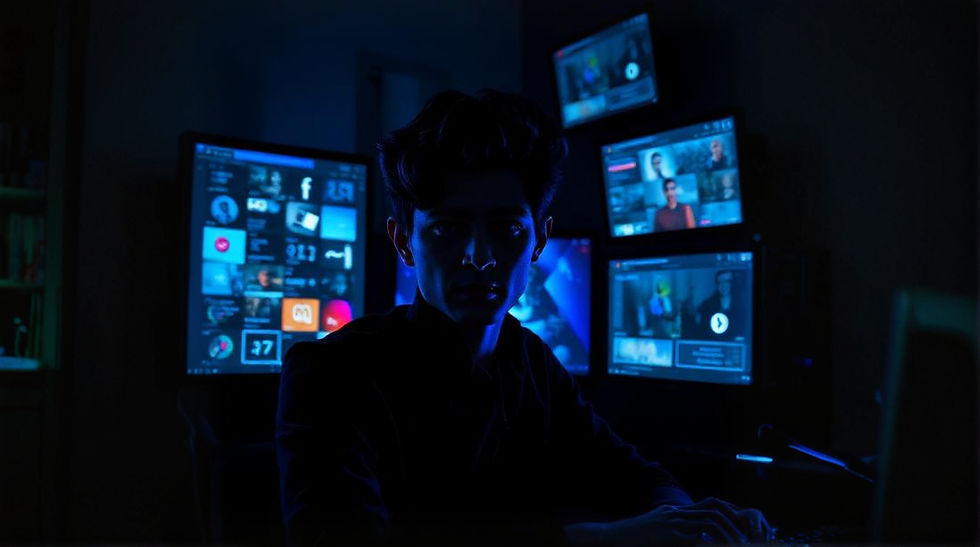Understanding the Male Loneliness Epidemic and Its Impact on Today's Young Men
- Socialode Team
- Nov 13, 2025
- 3 min read

If you’re a guy in your late teens, 20s, or early 30s, chances are you’ve seen the phrase “male loneliness epidemic” floating around TikTok, YouTube, or Reddit. Maybe you’ve even felt some of it yourself, that weird mix of isolation, pressure, and “everyone else seems to be doing better than me.”
You’re definitely not alone.
Across the country, young men are opening up (often anonymously) about feeling disconnected, unseen, or shut out of conversations about mental health.
And a lot of that conversation is happening online, in gaming communities, Discord servers, YouTube channels, and political spaces where young men are trying to make sense of what their role in society even is anymore.
Where this conversation started - Male Loneliness Epidemic
One KU student, Hudson Brown, grew up idolizing Han Solo and Luke Skywalker, classic heroes who represented strength, purpose, and leadership. But when the franchise introduced Rey, a new female prodigy, he found himself confused. To him, it symbolized something bigger happening in the real world.
“Traditionally, men have been the leading figures in society… and I think some men feel like they're being left behind,” Brown said.
He’s not the only one who feels this shift.
The numbers back it up
A Pew Research study found that both young men and women are lonelier today, but women are far more likely to reach out for help or talk to someone close to them. Men, on the other hand, often keep everything inside, sometimes because society taught them to, sometimes because they don’t have anyone they feel safe opening up to.
KU sophomore Brandon Coleman put it bluntly:
“There were years where I didn’t feel comfortable reaching out to anyone.”
Online life is fueling offline loneliness
Political science professor Don Haider-Markel says one huge problem is where young men now spend most of their time: online.
And yeah, if you’ve ever fallen into a cycle of Discord, YouTube, TikTok, (gaming, scroll, sleep). Even when you’re technically “talking to people,” it’s not the same as a real, in-person connection.
The result? Guys are feeling more isolated than ever.
And yes, politics is tied to this, too
Coleman believes social media poured gasoline on the issue.
“Social media brought out the worst in people.”
A lot of the loneliness conversation has been taken over by young conservative men who feel ignored or misunderstood by more liberal voices. Some feel society doesn’t value men anymore. Others feel like expectations have shifted faster than they can keep up.
Researchers have even found a connection between loneliness and more conservative outlooks, not because one “causes” the other, but because feelings of vulnerability or lack of control often push people toward ideologies promising structure, order, and a sense of identity.
The rise of figures like Andrew Tate and Joe Rogan

If you spend any time online, you’ve seen clips of Andrew Tate pop up, especially aimed at young men feeling stuck.
His message?
Life is hard. No one cares. Build yourself up. No excuses.
Whether people agree with him or not, the reason Tate’s message spreads so fast is simple: young men feel unseen, and someone is finally talking directly to them.
But does that actually solve anything?
Haider-Markel says no, not really.
He argues that conservative influencers aren’t offering mental-health solutions. They’re offering identity, something young men feel like they’re losing.
So what do young men REALLY want?
According to Brown and Coleman, the answer is simple:
✔ Someone to talk to
✔ A way to express their emotions without being judged
✔ Real mental health support
✔ A sense that they matter in society
The pressure is real, to be successful, confident, strong, emotionally stable, financially ready, relationship-worthy, career-driven, and somehow also chill about all of it.
As Coleman put it:
“The older you get, the more it weighs on you.”
The bigger picture: This isn’t about men vs. women
It’s about men vs. isolation.
It’s about men trying to figure out what adulthood looks like in a world that’s changing faster than any generation before us.
It’s about guys needing community, not just followers, not just group chats, not just podcasts telling them to “man up,” but actual connection.
Where do we go from here?
Brown thinks the solutions have to start at a national level:
“There should be a greater focus on mental health programs.”
Whether you’re conservative, liberal, or nowhere in between, the truth is: young men need more safe spaces to talk about their struggles.
Not perform masculinity. Not complete. Not pretend.
Connect. Talk. Be human.
Because loneliness isn’t a political issue, it’s a people issue.



